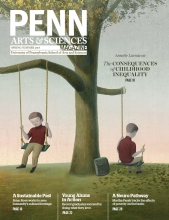The high-decibel incivility on political TV talk shows doesn’t only take a toll on public discourse. Diana Mutz says that these shout-fests also affect the human body in ways that change how people think about politics and politicians.
“Loud and angry voices trigger a fight-or-flight reaction that draws people’s attention and puts people on alert. As a result, these shows create strong physiological responses in viewers,” says Mutz, Samuel A. Stouffer Professor of Political Science and Communication. “Just as rubberneckers commonly stare at accidents on the highway, even people who say they hate shout shows have a hard time turning away.”
In her new book, In-Your-Face Politics: The Consequences of Uncivil Media, Mutz argues that the emotional intensity of political television draws audiences because it is highly arousing for viewers to watch politicians and pundits clash, particularly while appearing to be in close physical proximity on the television’s screen.
“The faces are shot in close-up and fill up TV screens to create an intimacy the way close-ups do in film,” says Mutz, who studied film and television as an undergraduate. “That adds even more intensity than incivility alone.”
Mutz’s research further demonstrates that televised incivility decreases trust in politicians in general as well as trust in government. She also suspects that in-your-face incivility turns many away from potential political careers. If what people see on television is what it is like to be a politician, then it is natural for them to want to “avoid partisan politics like the plague,” she says.
Research for the book, which is the first comprehensive study of the effect of high-octane political TV, was aided by Penn undergraduate and graduate students who helped manage Mutz’s lab and analyze data.
Politics is in the blood for Mutz, who is also the director of the Annenberg Public Policy Center’s Institute for the Study of Citizens and Politics. Her father John Mutz served as an elected official in her native Indiana for decades and was the state’s lieutenant governor for eight years, so she has seen firsthand the excitement that elections can generate.
In-Your-Face Politics also challenges the prevailing wisdom that Bill O’Reilly-style shows have no benefits. Highly arousing, conflict-filled programs make people more likely to remember the content and to relay it to others, whether online or in conversation. “Emotional intensity makes information memorable. It also drives viewership up,” Mutz argues. “The PBS-style of presentation may be civil and respectful, but it is also boring to most viewers, so they don’t watch it.”
Mutz feels that politics can be entertaining without being antagonistic. She says that the highest levels of political participation in the U.S. were in the days when politics were extremely social, with big parades and party gatherings. She would like to see a rekindling of that enthusiasm and the sense that politics need not be a dry, boring affair.
“Americans love competition,” Mutz says. “If primary candidates had an American Idol-type show, they could talk about different issues each week, and viewers could then vote the weakest ones off the following week’s show.” Free air time would lure the candidates to participate, while viewers would be attracted by the opportunity to see what politicians did with their airtime, and to have a say in who gets still more free air time to communicate with the American public.
She cites two Canadian television shows that combine substance and entertainment: The Naked News, which features attractive people reading the news while taking off their clothing, and Canada’s Next Great Prime Minister, a competition among political novices who try out their oratory before judges who are former prime ministers themselves.
“We need more innovation to make politics fun and interesting for the public without all the disrespectful discourse,” Mutz says.



